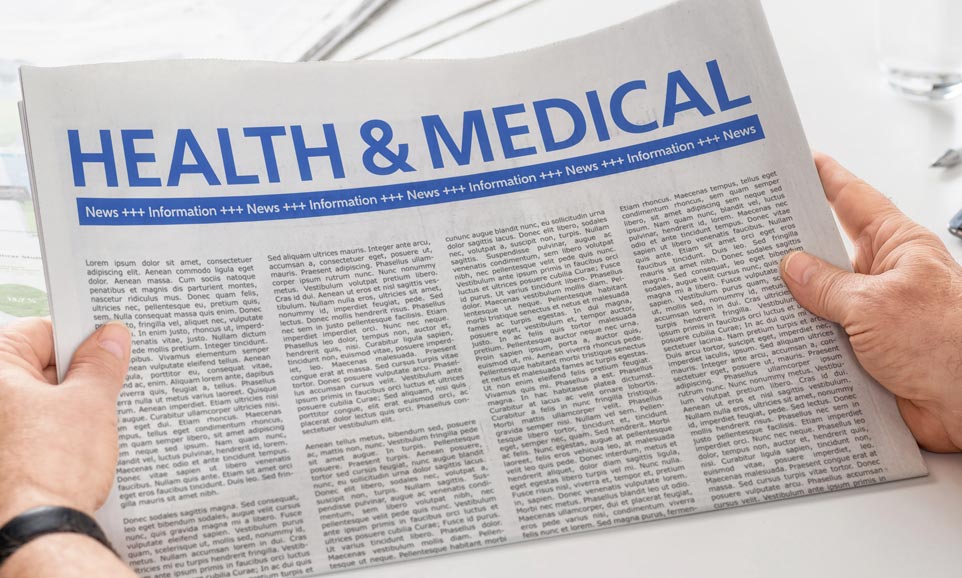Advertisment
What the papers say – weekly digest (02/02/24)

Your weekly digest of the top healthcare stories, covering news published from 29/01/2024 – 02/02/2024.
Daily Express
Birth defects linked to potent anti-epilepsy pills have led to strict new prescription rules being introduced. Patients below the age of 55 will no longer be able to start on sodium valproate unless two doctors sign-off on the treatment. The medication has been condemned as the ‘new thalidomide’ due to its risk of causing serious deformities and learning difficulties when taken by pregnant women – a reference to the 1960s morning sickness treatment which caused life-threatening birth defects. A damning report in 2020 concluded the Government had failed the 27,000 women taking valproate as many were unaware of its risks, with then Health Secretary Matt Hancock apologising on behalf of the NHS. The drug prevents seizures in epileptic patients by reducing the amount of electrical activity in the brain thought to be to blame. It is also used to calm manic episodes in people who have bipolar disorder by blocking nerve signals. Studies show that babies born to women taking valproate have an 11 per cent risk of defects, which can include cleft palates, small fingers and toes, and spina bifida – where the spine does not develop properly. The chance of learning difficulties, such as late speech or walking development, also stands at 40 per cent. Valproate has been linked to similar problems in children fathered by men taking the drug, too. One study found that children fathered by men who took the pill up to three months before conception were at a slightly higher risk of developing learning difficulties than those taking other medicines to prevent seizures. The new prescribing rule will also apply to women already on the drug. They will have to attend yearly reviews to be reminded of the risks and sign a form agreeing to continue. The only other drug on the NHS which requires two signatures is the anti-acne drug Roaccutane, which has been linked to serious depression and suicides.
For many of us, it’s the one thing that makes switching to a healthy eating regime bearable. But now scientists are considering dropping red wine from the Mediterranean diet promoted as a healthy regime. Along with fish, olive oil, and fresh ingredients, red wine in moderation has always been considered one of the reasons for longer lifespans of Southern Europe as compounds found in the skin of grapes can help ward off killers such as heart disease, cancer and dementia. The Mediterranean diet usually recommends a small glass or two of red wine a day with meals. But some studies suggest that there is no ‘safe amount’ of alcohol and that total abstention is best. The European Research Council – an EU body – is funding a four-year study involving 10,000 Spaniards to see how moderate wine consumption affects health issues such as heart disease, cancer and diabetes. Dr Miguel Martinez-Gonzalez, who is leading the trial at the University of Navarra in Pamplona, Spain published a paper last month entitled, ‘Should we remove red wine from the Mediterranean diet?’ His previous research suggests doing so would reduce the effectiveness of the diet, but he has fears about encouraging people to drink to excess. There are almost 21,000 alcohol-related deaths a year in England.
Doctors have hit out at the medical regulator for dismissing concerns that ‘cut-price’ medics called physician associates (PAs) are putting patients in danger. The Government said that over the next 15 years it would recruit 10,000 PAs – who are given two years’ healthcare training so they can assist doctors and nurses. However, the move is opposed by hundreds of doctors, as well as the British Medical Association, following cases where PAs have made mistakes leading to the death or serious injury of patients. The General Medical Council (GMC) is soon expected to publish guidelines on how it will regulate PAs – currently they cannot be held responsible for their mistakes. However, the GMC believes concerns over PAs will ‘dissipate over time’. The claim was made by a GMC employee during a meeting in May and became public following a Freedom of Information request. During the same meeting, an employee suggested the GMC reconsider its ‘communication strategy’ after the high-profile death of Emily Chesterton, 30, who died when a PA dismissed her blood clot symptoms as anxiety. Doctors believe the remarks reveal the GMC does not take the risk seriously. ‘PAs are a risk to patient safety, so it is alarming that the GMC believes doctors’ worries will disappear,’ says Dr Matt Kneale, co-chairman of Doctors’ Association UK. ‘Our concerns will not go away.’ A GMC spokesman said: ‘PAs are an important part of the health system. Regulation of these roles will play a vital role in keeping patients safe.’
The rising number of elderly people is a ‘’demographic timebomb’’ for the nation’s crisis-hit social care system, experts warn. It comes as forecasts published by the Office for National Statistics yesterday (Wednesday) said the population of people aged 85 and over was expected to grow from 1.6 million to 2.6 million over the next 15 years. The million-strong surge will place unbearable pressure on an already buckling social care system, where many elderly people do not receive enough help – or get none at all. Stephen Lowe, from retirement specialists Just Group, said: ‘’The population projections show that the clock is running down on a demographic timebomb for the Uk’s creaking social care sector. Twenty years of pronouncements and retreats on government policy have left the public confused and losing faith that the problem will ever be tackled.’’ Jan Shortt, of the National Pensioners Convention, added: ‘’Our message to those with the power to right the wrongs is to discharge your duty to the people, invest in the NHS, invest in a National Care Service free at the point of need.’’
Brain cancer campaigners yesterday demanded the Government make ‘’game-changing investment’’ into research on the killer disease. A petition signed by 81,336 people calling for studies to be made a priority was handed into 10 Downing Street. Organised by charity Brain Tumour Research, the petition was delivered by among others, Antiques Roadshow expert Theo Burrell, who was just 35 when she was diagnosed with an incurable cancerous brain tumour. Theo, 37, said: ‘’No-one knew what was wrong and when I finally had a scan, I was told I had brain cancer and without surgery, had just three months to live. I am frustrated it took so long to get my diagnosis. We need to change that and it’s vital the Government invests more money in research.’’ Money for investigation into brain tumours still represents just 1% of cancer funding since records began in 2002. Dan Knowles, chief executive of the charity, said: ‘’In the last 20 years, research spent in the UK on breast cancer has been six times more than brain tumours – and survival rates have doubled.’’
Daily Telegraph
Men could cut their risk of prostate cancer by more than a third if they improve their fitness levels by just 3 per cent a year, a study has suggested. Experts have found a statistical link between changes in men’s fitness levels and their risk of developing the cancer for the first time. The study of more than 57,000 men, with an average age of 41, found that those who were able to increase their cardiorespiratory fitness by 3 per cent each year were 35 per cent less likely to develop prostate cancer, than those who did not. Researchers measured the amount of oxygen the body uses while exercising at a high intensity to determine their fitness level, also known as the VO2 max. A person can increase their fitness or oxygen capacity through regular exercise, such as by running, cycling or swimming, at least three times a week. The men were assessed over an average of seven years during which time 592, or around one per cent, of the 57,652 participants were diagnosed with prostate cancer. The men were categorised into groups depending on how much their fitness level changed each year. Those with an increase in their fitness level of 3 per cent or more, a reduction by 3 per cent or more, and those who remained stable. The rate of prostate cancer was highest in the group whose fitness levels fell and lowest in the group whose fitness levels increased. Simon Grieveson of Prostate Cancer UK said that the new research ‘’adds to previous studies showing possible links between exercise and a lower likelihood of getting prostate cancer’’.
Rishi Sunak today (Wednesday) promises a pharmacy ‘’revolution’’ to cut treatment waiting lists in the NHS. Writing in the Telegraph, the Prime Minister says new powers for pharmacists will free up around 10 million GP slots every year. From today, patients can get treatment for seven common conditions without needing to see a GP under the shake-up of pharmacy services. Thousands of pharmacists across England will be able to assess and treat patients for sinusitis, sore throat, earache, infected insect bites, impetigo, shingles and uncomplicated urinary tract infections in women under 65. Women will also be able to get the Pill from pharmacists. It is hoped that by taking simple cases away from GP’s they will be able to see patients with more serious conditions – so ensuring they see consultants more quickly. NHS England said more than nine in 10 community pharmacies in England – 10,265 in total – will offer the checks under the Pharmacy First scheme. They will also increase the number of blood pressure checks given to at-risk patients over the next year in an attempt to prevent more than 1,350 heart attacks and strokes. The Prime Minister said the government was investing up to £645 million over the next two years to help pharmacists deliver the new services. ‘’These are simple reforms, but they add up to the biggest change in pharmacy services for years, with benefits that will flow out across the NHS,’’ he said.
Ministers are to ban the sale of ‘’snus’’ nicotine pouches to under-18s after schools raised fears children are increasingly turning to the powerful products as a vaping alternative. The crackdown is part of a government plan to protect children and young people from the harms of smoking and vaping. Snus pouches are small bags containing nicotine and flavouring which are placed between the lip and the gum allowing them to be absorbed into the bloodstream. While traditionally used as a tool to help smokers quit, a legal loophole means they can be sold to under-18s because they are not classed as tobacco products in law. This is despite nicotine itself being highly addictive. They have grown increasingly popular among teenagers after being promoted on the social media platform TikTok. Tomorrow (Monday) the government is expected to confirm that pouches be brought under the same regulatory framework as nicotine vapes. This will mean children can no longer buy them in shops or online. The plans will form part of the government’s response to its consultation on creating a smoke-free generation and tackling youth vaping. New legislation to allow for tighter restrictions was promised in the King’s Speech last year.
A portion of kimchi with every meal could prevent obesity and help maintain a slim waist, a study suggests. The pungent Korean fermented cabbage and vegetable dish has been growing in popularity in the UK. Past studies have shown the food , served in 50g portions, or three large tablespoons, may improve levels of beneficial bacteria in the gut. Now, a new study has found that cabbage kimchi may lower the risk of obesity. The research, published in the journal BMJ Open, examined data for 115,726 people aged 40 to 69 in Korea, who were asked about their consumption of kimchi via food questionnaires. The results showed that men with a total kimchi intake of one to three servings per day had an 11-12 per cent lower risk of obesity when compared to men who ate less than one serving per day. Men with a higher intake of cabbage kimchi (over three servings a day) had 10 per cent lower odds of obesity and excess weight round their stomach and abdomen. The risk was eight per cent lower in women for this type of kimchi.
The Guardian
A groundbreaking gene therapy has been hailed as a ‘’medical magic wand’’ after the treatment transformed the lives of patients with a hereditary disorder that causes painful and potentially fatal swelling. Patients who took part in the first human trial of the therapy experienced a dramatic improvement in their symptoms, with many able to come off long-term medication. Dr Hilary Longhurst, principal investigator at Te Toka Tumai, Auckland city hospital, said the single-dose therapy appeared to provide ‘’a permanent cure’’ for her patients’ ‘’very disabling symptoms’’. Hereditary angioedema, or HAE, is a rare disease that affects about one in 50,000 people and is caused by a genetic mutation that leaves patients with leaky blood vessels. This produces erratic bouts of swelling that typically affect the lips, mouth, throat, bowels, hands and feet. Attacks strike as often as twice a week and last from hours to days. People can end up bedridden if swelling affects the bowels, while its disfiguring impact on the face can stop people leaving home. The most serious flare-ups affect the throat and can lead to suffocation and death. HAE is caused by a mutation in the gene that controls the C1 inhibitor and when it stops working, people overproduce a protein called kallikrein, driving the build-up of another protein, bradykinin, which is responsible for leaky blood vessels and swelling. The results from the first patients are published in the New England Journal of Medicine, but larger trials are underway. Doctors have now treated 25 more patients in a phase 2 trial and hope to recruit for a final trial next year. Despite the results, the therapy is not expected to be available soon. Such one-shot gene therapies are among the most expensive treatments in the world, with the estimated cost of such therapies between $1m and $2m.
Playing a musical instrument and joining a choir are both linked to better memory and thinking skills in older age, research has found. The piano was especially associated with a better brain in those over 40 in the study from Exeter University, which reviewed data from more than 1,000 adults. The scientists investigated brain health, including mental processes that help in planning, focusing, remembering and juggling tasks and found those who played an instrument scored higher. Singing was also linked to better brain health, but the researchers said the social factors of being part of a group may also play a role. Anne Corbett, professor of dementia research at the University of Exeter, said: ‘’We think that being musical could be a way of harnessing the brain’s agility and resilience, known as cognitive reserve.’’ Corbett said the findings indicated that promoting musical education could be a valuable part of public health initiatives to foster a protective lifestyle for brain health – as would encouraging older adults to return to music later in life. Caroline Scates, deputy director of Admiral Nurse Development at Dementia UK, said the results of the study echoed similar research into the benefits of both listening to and playing music for people living with dementia. She said: ‘’Music can provide a valuable form of communication for people living with dementia. The ability to make or play music – whether by singing or playing an instrument – can continue even when people living with dementia have lost other abilities and means of communication. If you know someone living with dementia who enjoys or has enjoyed singing or playing an instrument, it can be beneficial to keep these instruments or sheet music to hand for them to play or read.’’
Ministers will ban disposable vapes as part of a UK-wide attempt to curb the youth vaping epidemic. The government is also seeking to make vaping less appealing to children by restricting sweet and fruity flavours, introducing plain packaging and making displays less visible in shops, under new powers announced today. The changes are expected to come into effect towards the end of this year or early 2025. The move forms part of a wider response to a public consultation on smoking and vaping, which has resulted in plans for some of the world’s toughest anti-smoking measures, first revealed by the Guardian, including a ban on selling tobacco products to anyone born on or after 1 January 2009. Although vaping can be a tool in helping adult smokers to quit, doctors are concerned about the unknown long-term health impact of vaping on young people and their developing respiratory systems, including nicotine addiction, which can cause anxiety and withdrawal headaches. Recent figures show the number of children using vapes in the past three years has tripled, with 9% of 11-to 15-year-olds now vaping. The proportion of 11-to 17-year-old vapers using disposables has increased almost ninefold in the past two years. The ban will also reduce the major environmental impact of disposables, since 5m vapes are thrown away each week, up from 1.3m last year. The government is hoping to introduce the legislation that will ban disposable vapes as soon as possible by using existing environmental protection laws. The ban will also be implemented in Scotland, Wales and Northern Ireland. Ministers will have to pass the tobacco and vapes bill, included in the king’s speech, to obtain powers to make the changes. The UK Vaping Industry Association said that, while it welcomes on-the-spot powers to deal with underage sales , it was ‘’dismayed’’ by the decision, which could discourage smokers from using vapes to quit.
Novo Nordisk shares hit a record high after the Danish company reported soaring sales of its obesity and diabetes drugs Wegovy and Ozempic, pushing its market value past $500bn and cementing its position as Europe’s most valuable company. Runaway demand for the drugs has left the firm struggling to keep up with orders and scrambling to expand production sites. Novo Nordisk shares rose by 4% yesterday before settling to trade 1.2% higher, leaving its market value hovering near $500bn (£394bn). The obesity drug boom has turned the drugmaker into Europe’s most valuable company. Obesity drug sales jumped by 154% at constant exchange rates to 41.6bn Danish kroner (£4.8bn) last year, fuelled by demand for Wegovy, which brought in £3.6bn. Sales of diabetes drugs such as Ozempic grew by 52%, and obesity and diabetes drug sales totalled nearly £25bn. Overall sales rose by 36% to £26.6bn, while profit before tax jumped by 52% to £12bn. The company expects sales growth to slow to between 18% and 26% this year, and operating profit growth of 21% to 29%, as competition increases and supply constraints continue.
The Times
The death rate from bowel cancer of people under the age of 50 in the UK is on course to rise by a third this year, according to projections that experts say are alarming and stem from a surge in obesity, poor diet and physical inactivity. Death rates among those aged 25 to 49 are predicted to increase by 39% among women and 26% for men in 2024, compared with the average between 2015 and 2019, the last five-year period for which data was studied. The findings were published in the journal Annals of Oncology. Bowel cancer death rates are forecast to rise in women of all ages in the UK, another trend that does not appear to be following the declining pattern of most cancers. Experts said there was an urgent need to encourage adults to adopt healthier lifestyles earlier in life. The findings also prompted calls for earlier screening. More than half of bowel cancer cases in the UK (54%) are preventable, according to Cancer Research UK. More than a quarter of cases (28%) are caused by eating too little fibre, 13% by eating processed meat, 11% by obesity, 6% by drinking alcohol and 5% by too little physical activity. There is global concern about rising numbers of younger adults being diagnosed with cancer. The number of under-50s worldwide being diagnosed with the disease has increased by nearly 80% in three decades. The latest research looked at the EU’s five most populous countries – France, Germany, Italy, Poland and Spain – as well as the UK, and predicted cancer death rates this year compared with the average between 2015 and 2019. While death rates for all cancers taken together are predicted to fall, the study revealed concerns about younger people with bowel cancer. Apart from France, bowel cancer death rates among people aged 25 to 49 are forecast to rise in 2024. The increase predicted in Italy is 2.6% among women and 1.5% among men, In Poland and Spain, among men it is 5.9% and 5.5% respectively, while in Germany the rate among women is predicted to rise by 7.2%. However, the UK showed jumps of 39% in women and 26% in men. The UK is also the only country of the six where bowel cancer death rates are forecast to rise in women of all ages, albeit only by 1.4%.
The morning-after pill should be available off the shelf in supermarkets and petrol stations, with no need for a consultation, leading doctors have urged. The current system, which requires women to have a conversation with a pharmacist before they are sold the emergency contraception, acts as a barrier, they said, particularly at evenings and weekends. The Faculty of Sexual and Reproductive Healthcare (FSRH) said because the pill – which is ‘’very safe’’ – is most effective when taken as soon as possible after unprotected sex, it needed to be more convenient to get hold of. Alongside reproductive health charities, the FSRH is calling for oral emergency contraception to be reclassified from a ‘’pharmacy’’ medicine to ‘’general sales list’’. This would put it in the same category as painkillers such as paracetamol and ibuprofen, and mean it could be sold in other shops. Dr Janet Barter, president of the FSRH, said: ‘’Access to contraception is such a basic human right and it is high time we begin to remove the barriers people face accessing oral emergency contraception.’’ She said that while consultations with pharmacists could be very valuable, ‘’the requirement does pose a barrier for some people, particularly on evenings, Sundays or national holidays when most pharmacies are shut’’. Barter added: ‘’Oral emergency contraception is a very safe medication. However it must be taken within a window of three to five days, and the sooner it is taken the more effective it is. It is of utmost importance that people can pick it up as soon as possible.’’ She said a further important step to improve access would be to make the drugs free for everyone. There were more than 123,000 abortions carried out between January and June 2022, the most recently available figures, up from just over 105,000 in the same period a year earlier.
Scientists have hailed ‘’truly remarkable results’’ after an experimental treatment restored the hearing of children who had been born deaf. Five out of six children in China who were given a new gene therapy showed significant improvements in hearing, with experts expressing hopes that the study marked the ‘’dawn of a new era’’ for reversing certain types of congenital deafness. Four of the children, all aged under seven, had been able to perceive sounds using cochlear devices. Six months after treatment, the hearing of two had improved to the extent that they could follow a single conversation in a noisy room with the implants switched off. Dr Zheng-Yi Chen of Harvard Medical School, a co-author of the study, says he is optimistic that the same approach could reverse hearing loss caused by other faulty genes, which are thought to account for 60 per cent of cases of deafness in children. ‘’This is a huge milestone that symbolises a new era in the fight against hearing loss,’’ he said. Not since the invention of cochlear implants in 1957 had there been an effective new treatment for deafness, he added. According to the National Deaf Children’s Society, three babies are born deaf in the UK every day.
Regular periods of fasting with 24 hours between meals could reduce the risk of diseases such as diabetes and Alzheimer’s, a Cambridge study suggests. Researchers have found that leaving a full day between meals can cut levels of harmful inflammation in the body by boosting production of a key fatty acid. Fasting diets have grown in popularity, with claims that they are effective as a means of weight loss, as a way of keeping the body’s cells healthy, and even for aiding productivity. It was reported on Sunday that Rishi Sunak fasts for 36 hours at the start of every week. When the human immune system is triggered, inflammation begins with the body preparing to defend itself and repair damage. But long periods of inflammation have been linked with disease. ‘’We’re very interested in trying to understand the causes of chronic inflammation in the context of many human diseases, and in particular the role of the inflammasome (molecules that activate inflammatory responses),’’ Clare Bryant, from Cambridge University’s department of medicine, said. ‘’What’s becoming apparent is that one inflammasome in particular – the NLRP3 inflammasome – is very important in a number of major diseases such as obesity and atherosclerosis, but also Alzheimer’s and Parkinson’s.’’ Scientists asked 21 volunteers to eat a 500-calorie meal, fast for 24 hours, and then eat another 500-calorie meal. The results, published in the journal Cell Reports, found that this 24-hour fast increased the levels of a fatty acid called arachidonic acid. These levels dropped again once the participants ate another meal. The researchers tested the effect of this acid on immune cells and found that arachidonic acid reduced the activity of the NLRP3 inflammasome.





